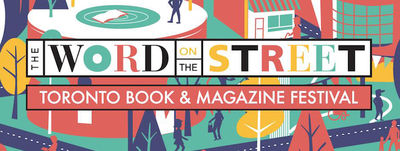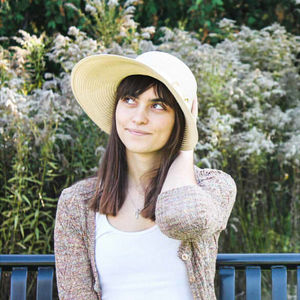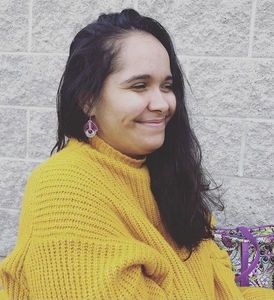The Word on the Street's Sienna Tristen & Yeli Cruz on the Inclusivity & Excitement of a 10-Day Virtual Festival
2021 will mark the second time Toronto literary festival The Word on the Street takes their stellar line up of author talks, readings, panels, and workshops online, with a line up that includes folks like André Alexis, Casey Plett, Eden Robinson, Zoe Whittall, and many more.
After decades as one of the city's most beloved literary events, the pandemic forced the WOTS team, like so many other literary organizations, to reimagine their programming for a virtual landscape. Following a successful 2020 festival and a new expanded year-round event calendar, they return this year with a packed line up that spans not just the traditional two-day length of the in-person festival but an impressive run from September 16 to 26 (click here to check out the full festival programme).
We got to talk to Events Coordinator Sienna Tristen and Coordinator of Special Events Yeli Cruz from the WOTS team to discuss what it's been like to continue to online shift for the festival, what they're most excited about in this year's line up, and working with their brand new programming advisory committee to curate inclusive, innovative events.
Open Book:
This is now your second virtual festival and online literary events have become more widespread. What has the experience of shifting the festival online been like? Are there are any differences between last year and this year?
Sienna Tristen for The Word on the Street:
Like many people working in the arts sector, everyone at WOTS has needed to pick up a few new skills for this shift to digital! Suddenly we all had to learn how to be YouTube producers. It was hectic at first, but we’ve discovered over the past year and a half that there are myriad benefits to online events: we can invite authors who live on the other side of the country without needing to factor in travel costs, and readers can also tune in from anywhere. That inclusivity extends even to people within the Toronto area; there are plenty of local readers and writers for whom attending a physical festival is difficult or impossible, and we’re very glad to be able to welcome them into the WOTS experience in this way.
The biggest difference between 2020 and this year’s festival is our better understanding of what it means to thrive as a virtual event. Last year we jam-packed two days with a truly astonishing 70+ events—we had three livestreams running simultaneously! And we did this because it’s how an in-person event would run, because of the restrictions and parameters of holding a huge book festival in physical space. When we took the time to really think about how to leverage the unique traits of virtual events, instead of simply trying to copy an in-person event as exactly as possible, that’s when our strategy changed. We’re still livestreaming to YouTube, but this year our festival is running over ten days, from September 16-26, with anywhere between three and ten events happening on a single day. We’re hoping this relaxed pace will give attendees the breathing room to fully experience each panel, instead of rushing along to the next thing. It also means we can put our full attention on one event at a time, which our amazing authors deserve; no two panels are happening at the same time, so you don’t have to make agonizing choices about which to watch live anymore!
OB:
What is The Word on the Street’s approach to programming? It must be difficult to choose from so many great Canadian writers – what does the process look like?
ST:
This is another really exciting development this year—we appointed an Advisory Committee to support the programming process. For many years, the amazing programming WOTS presents has come out of the imaginations of just one or two people (shoutout to Maya, our Programming Manager!), but now we’re blessed with a group of Canadian authors and publishing professionals across the country who help us identify gaps in both topics and speakers. This year’s roster wouldn’t be what it is without the efforts of Nancy Cooper, Deborah Dundas, Terese Mason-Pierre, Danny Ramadan, and Kerri Sakamoto. We’re so grateful to you all!
In broad terms, the process looks like this: the programming team attends pitch meetings with as many Canadian publishers as possible, who suggest all the titles they’re excited about promoting. We compile those titles into a list that might run maybe a kilometer long if you printed it out, and then we begin sifting it for thematic patterns—things like “there are a lot of mental health memoirs this season” or “hey, look at all these experimental poetry books!” From these themes, we tend to find the heart of a conversation that authors would be interested in having: something about using humour to work through grief, for instance, or about why YA literature is so good at exploring community and connection. Once we start nailing down panel topics, we have the agonizing job of narrowing down possible panelists for each discussion—and that’s where our Advisory Committee have helped us so much this year!
At WOTS, we want our panels to reflect the actual vibrance and variety of Canadian & Indigenous writers and storytellers, and what with the unique advantage of having the whole country open to us for this virtual festival, we’ve tried our best to bring together artists from all walks of life. We’re really proud of this year’s September lineup—and we’re equally proud that we were able to feature so many authors during the spring and summer!
Your CanLit News
Subscribe to Open Book’s newsletter to get local book events, literary content, writing tips, and more in your inbox
Yeli Cruz for The Word on the Street:
Yes, especially with our festival program being virtual this year, we don’t really have the space to highlight everyone that we’d like to! So this year we’ve been hosting a series called the WOTS Weekly Features so that we can showcase some of the folks that we would typically have in our Exhibitor Marketplace. At its core, it was a series of 20-30 minute interviews with authors, editors, arts organizers, and more, and it was definitely my favourite thing to do this summer—our goal was really to encourage a sense of literary community and connection without having a physical space to do so. We also try to highlight a diversity of voices as much as we can—for Weekly Features, we developed themes that allowed us to dip our toes into many different authors and types of lit, like Multiculturalism Week, Indigenous People’s Week, Poetry, YA Literature, Memoir, and more! It’s been a blast to showcase more authors and people doing great work in CanLit.
OB:
Over the past few years, The Word on the Street has expanded from the beloved one-day festival to a whole year-round calendar of literary programming. What prompted this expansion and what has it been like for the festival team to implement such a big change?
ST:
In the end, we’re a small group of super-ambitious people! We’ve all got ideas for cool events or conversations or ways to connect readers to their next favourite story. Not every idea can fit into a one- or two-day festival, so I guess it was inevitable that eventually we would start creeping into the rest of the calendar.
The first step into becoming a year-round literary presence was our City Imagines series—the inaugural event was held live as a keynote for our 2019 in-person festival, and once 2020 became a year for virtual programming, we saw lots of potential in holding a monthly conversation about cities and the books that help shape them. If you’re into more in-depth discussion around topics like public transit, 15-minute cities, Indigenous resistance, and of course our city’s response to the pandemic, then City Imagines is for you. Our other monthly event is Book of the Month, which is more like a tasty morsel of the September festival during not-September: readings and one-on-one Q&A sessions with authors of fiction, non-fiction, poetry, and more! Great for listening or watching during your lunch break.
We’re really happy with these new recurring series, and we’ll definitely be continuing them as virtual events even once we’re able to put on our in-person festival again. Like you said before, it’s tough to choose between so many great Canadian writers—with programs like these, we get to invite more artists to the party!
OB:
The festival has a long history, especially as an integral part of the Toronto literary community. In what ways does that legacy impact your strategy for the current festival and its future?
ST:
We do a lot of talking at WOTS about how best to serve our community. As a cultural mainstay in Toronto for over thirty years, we take it really seriously, the need to stay relevant and welcoming to readers, writers, and the rest of the literary ecosystem. We’re a festival for everyone—we’re proud of our family-friendly programming, we’re making strides every year with accessibility measures, and we’re committed to remaining totally free to attend. All of this informs the way we choose our path forward as a festival.
“Serve the community” can mean a lot of things, but one thing I’m personally excited about is how we’re expanding the notion of what “belongs” at a literary festival. We recently changed our mandate to “celebrating storytelling, ideas, and imagination”, and you’ll notice that the word book doesn’t show up there. While books and other published works are still absolutely at the heart of what WOTS cares about, we’re also excited to create space to discuss and discover other means of storytelling, including oral storytelling, music, roleplaying games, even fanfiction! Our authors and our audience engage their imaginations in all sorts of ways, and I think it’s time we started to reflect that.
OB:
The full schedule for The Word on the Street 2021 is packed with great appearances, but can you tell us about one or two virtual events you’re especially excited about in this year’s festival?
YC:
I am most looking forward to Return of the Trickster: A Conversation with Eden Robinson (Sept 25). We watched the finale of Trickster (the TV show) for our last staff social, and I am simply dying to hear Eden Robinson speak about that story! I am also looking forward to the KW Writer’s Alliance panel about Writers on Reading (Sept 19) – writing and reading pretty much covers all of my major interests, so you will DEFINITELY see me in the chat for that one!
ST:
You’re asking me to choose between brainchildren! But if I had to point you in a direction, I’m looking really forward to our Climate Fiction for the Cautious Optimist panel (Sept 20), because I like to see hopeful, generative discussion around the climate crisis in fiction. I’m also a big fan of Liz Howard’s poetry, so her conversation about Letters in a Bruised Cosmos with Sarah Yi-Mei Tsiang (Sept 17) is high on my list. As WOTS staff, we’ll each only get a few days during the festival to actually watch our program, so you better enjoy it for us!
________________________________________________________________
The Word on the Street is a national celebration of reading, writing, and literacy. Each September, it hosts hundreds of author readings for visitors of all ages and a vibrant marketplace featuring the best selection of books and magazines in Canada. The Word On The Street champions reading and writing in Canada primarily through a free celebration of storytelling, ideas, and imagination.
Sienna Tristen (they/she) is an author, poet, and literary organizer. Her award-winning fantasy novel The Heretic’s Guide to Homecoming came out from indie arts collective The Shale Project in 2018, and you can find her poetry in Augur Magazine. While the sun is up, Sienna works with The Word On The Street, one of the country’s biggest book festivals; once it goes down, their time is spent finishing their second novel and playing with their baby bearded dragon Jevick.
Yeli Cruz is a Venezuelan-Canadian poet and lover of audiobooks, cozy sweaters, and birds. She loves reading and writing stories about found family and imagining new worlds. She is the Assistant Coordinator of Special Projects at The Word On The Street, where she coordinated the Weekly Features program! When she’s not working at WOTS, you can find her creating podcasts about body liberation and cuddling her very loud poodle, Cookie.





